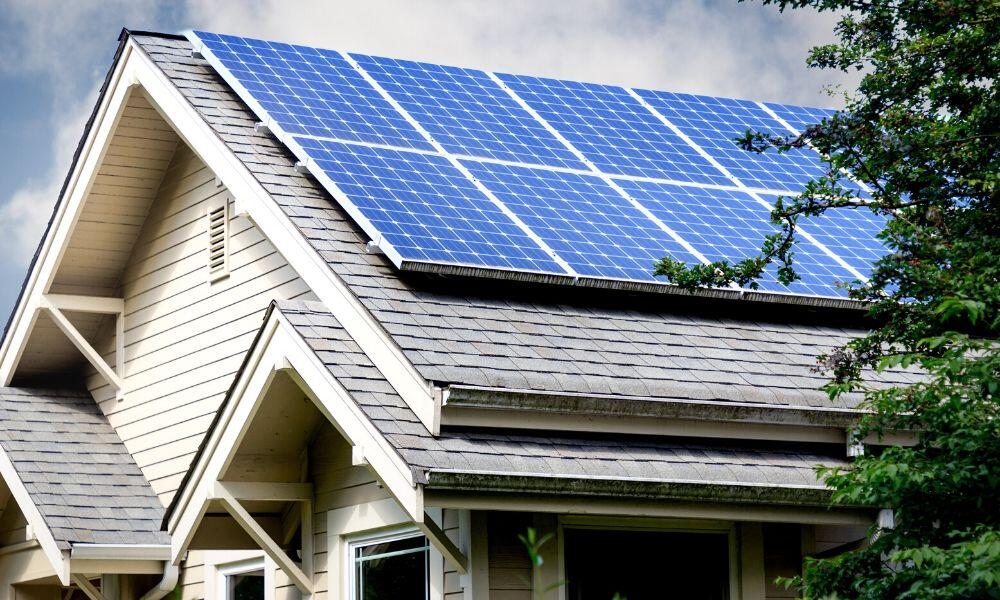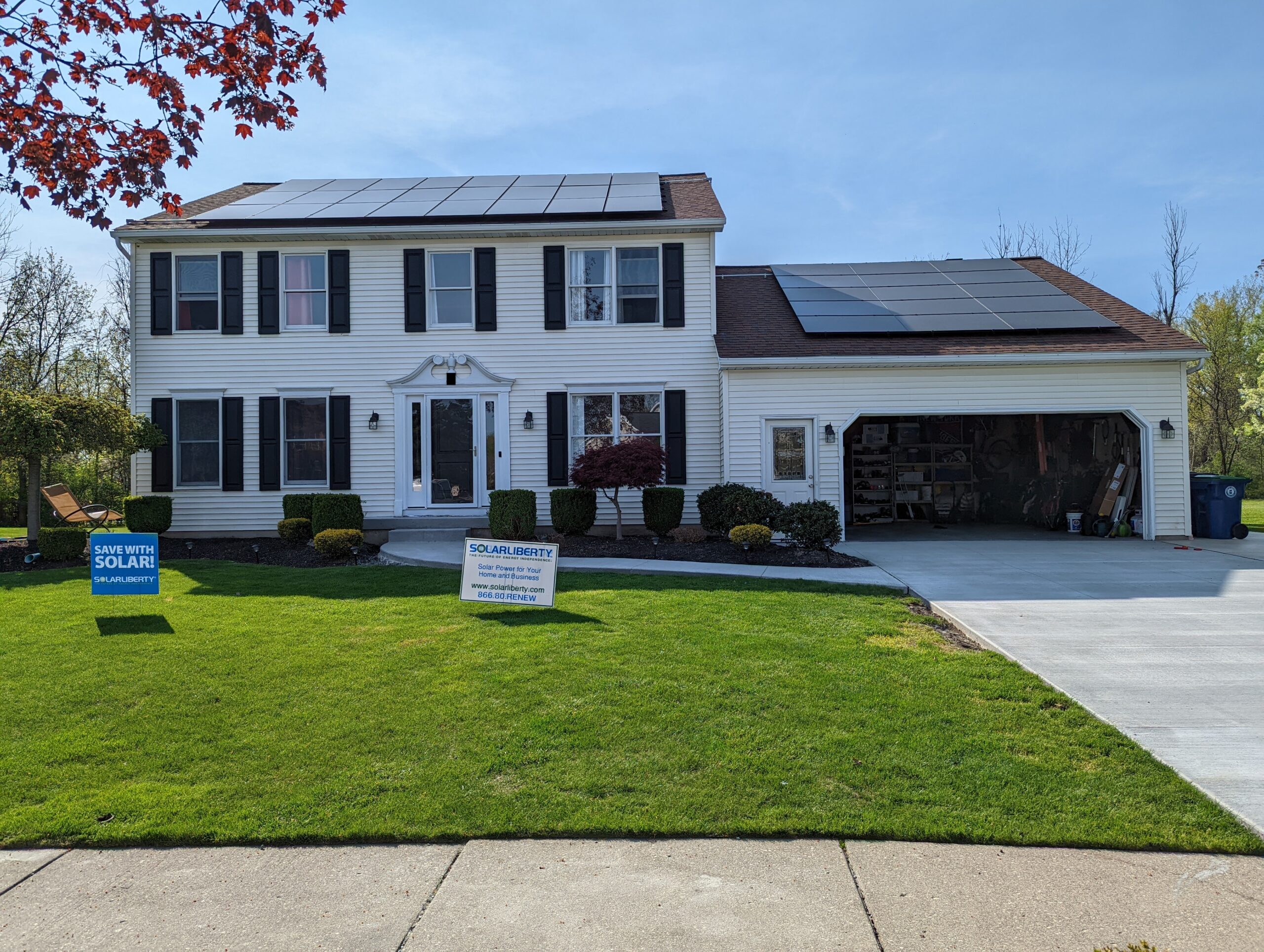Here Comes the Sun: Ashford Considers Solar Energy
ASHFORD, NY — The Town of Ashford may be going green in the near future, as the Ashford Town Board discussed the possibility of installing solar panels from Solar Liberty on the roof of the community center.
Bridget Reagan, commercial sales consultant from Solar Liberty, attended the meeting to present the board with an overview of the panels and their potential and to answer questions from board members and the community.
“Solar Liberty has been a turnkey installer of solar energy panels since 2003. There is a manufacturer’s warranty on the panels for 25 years and a 10-year warranty on the inverter, as well as a standard five-year warranty on the installation,” Reagan explained. “The amount of energy output is determined by the pitch of the roof, the angle of the sun and 30-year average output data from your zip code. The ideal climate for solar energy is between 40 and 85 degrees, so the Western New York climate is actually very advantageous for it.”
Board Member John Pfeffer had several questions regarding the project. “The payback period is my biggest concern,” he said, referencing the projected 14 years the panels would take to begin producing energy to cover more than the original installation cost. “If we’re looking at 10-11 years of warranty after that [initial 14-year period], then are we really getting our money’s worth?”
“We say there’s usually 35-40 years of lifespan on the panels, so, for at least the next 10, that’s free electricity,” said Reagan. “You’re basically pre-purchasing your electricity. When you work with an electric company, there’s a price increase every year, on an average of 3 percent. In 15 years, who knows what you’re going to be paying for power? With these panels, you’re producing power right where it needs to be, no need to worry about it after that. In 10 years, you’ll have no electric bill; that’s the glory of it. Plus, you’ll have a smaller carbon footprint, putting Ashford on the map of green energy.”
Pfeffer also asked how to dispose of the panels once they are no longer in use, or in case of failure, since the panels include hazardous materials, similar to many modern electronics. Reagan was not able to comment on how the materials would be disposed of in the event that the town needed to do so.
In addition, a grant to municipalities from the New York State Energy Research and Development Authority for alternative energy sources provides monetary support for the project, but only for a limited amount of time. Reagan hypothesized that the grant would last until 2015 or 2016, but was unable to guarantee how long it would last.
“In 2016, when the NYSERDA grants run out, you’re going to lose a large chunk of business,” Pfeffer said. “How do we know you’re going to be there for us in five years?”
Reagan responded that Solar Liberty contracts with commercial, municipal, residential and even international clients, and that she expects, “we will be around for a very long time.”
She added that the installation of solar panels provides not only an energy-production opportunity, but a community education element, as well.
“Students can learn how solar energy works,” she said. “This is going to educate the community. Kids are going to look at it and see what’s in their future. Electricity has already been budgeted for the town. Let’s add the element of education. There’s a lot of community involvement possible here.”
Town Supervisor Chris Gerwitz, who uses solar panels to provide electricity at his own home, spoke in support of the project. “I’m all for it,” he said. “I’ve got it on my house. It works and it saves money.”
“The history of solar power just isn’t as good as I’d like it to be,” said Pfeffer. “I’m more concerned with creating a boondoggle than anything else. I’m concerned with putting hazardous waste on our roof we’ll have to dispose of down the road. That’s what concerns me. I don’t buy into the green thing. I don’t care about being green or not being green, but I don’t have a good feeling about it.”
Budget Officer Bill King said he supported the project because of its financial viability for the town. “I look at it this way: even if it fails in five years, I still don’t see a loss. We’re getting free electric, so we’ve got the money we would use for electric to put toward that,” King said.
Board Member Charlie Davis said he thinks it is important to consider the whole project, not just the installation. “I got so wound up in the green energy idea, I hadn’t thought about how to dispose of them in 25 years,” he said.
Paul Bembia, program director for West Valley Site Management and NYSERDA representative, said he was unable to say how the panels would be disposed of, but that NYSERDA is invested heavily in renewable energy.
“It’s like a lot of electronics today,” Bembia explained. “You recycle them because you don’t want all those heavy metals going into the land. I assume there’s somebody out there who’s taking care of that, but I’d have to get the info on that.”
The board members decided to wait for those particulars before proceeding. “If it costs $100,000 on the back end, we’ve just wasted all that money. We want to look at it, cradle to grave,” Gerwitz said.
The town of Ashford budget proposal was also presented for a public hearing, in which no objections were heard.
Davis thanked those involved for their hard work on the budget proposal.
“It’s amazing in this day, age and economy that we can keep our town’s budget on an even keel. I think that gives credit to our budget officer, our town supervisor and everyone who worked on it for keeping it where it is,” Davis said.
Board Member Beverly Hess added that she wanted to make sure residents were aware that the town of Ashford is holding the line on the budget. “We need to voice that around. The county is going to go up, and people are going to look at their bills and say, ‘Mine went up.’ And we’ve got to make sure they know the county went up; Ashford didn’t,” she said.
“People don’t realize the budget has actually gone down $100,000 over the past 20 years, through savings and that,” Davis added. “We’re the only town in the state that can say that.”
The town board also heard a report by Bob Runge from the water company, who said it is working to fix leaks from the recent National Fuel line repair project and other issues that have arisen, given the age and condition of the water system in addition to National Fuel’s disruption of some of the lines.
“When National Fuel came through town, there were a lot of breaks we had to fix. They did not follow dig safe regulations, and we sent them bills to help fix it. We’re still fixing those leaks, and we’re trying to document it. We’re going to have to engage a lawyer to help us get the money, so we’re working to get straightened out with the Environmental Service Commission,” Runge explained.
“There is going to be a surcharge written by public service, money set aside to fix leaks above our budget. If National Fuel pays, that money will go back to pay off the balance and the surcharge will go back to the users. We’re running into the collapse of the system. Right now, we’ll be fixing a leak and one starts popping down the road. We’re getting to the point where we can’t fix it,” he added. “The National Fuel dig near services weren’t careful, and there’s not enough valving. If I have to shut the whole system down, it will probably take a day to get it back up.”
Runge said that he hopes the company’s attorney will convince National Fuel contractors to pay the balance, and that he also expects the Public Service Commission to cooperate to help the project move forward.
The company is also working on a total system replacement for the town of Ashford, in which all water use will be metered individually by house. Each user will pay only for what he or she uses in addition to the minimum use charge.
He also addressed the question of whether or not hydrants will be included in the water plan. “I can’t tell you the current designs. Some show hydrants in the village,” he said. “At this time, volume will determine the amount we’ll store. If we decide on hydrants, we’ll have to have them in different locations and a different number according to the new rules.” Runge added that the implementation of hydrants would improve homeowners’ insurance, but that he was not able to say to what degree.
“We already spent $100,000 to get it into testing compliance. The sooner we get it replaced, the better off we’ll be,” he said. “This is a 100 year-old system. Just exposing that line will cause it to leak.”
King suggested addressing the fire department personnel about the benefits of fire hydrants in Ashford. “I’d ask that you meet with the fire company to discuss with them before making the final decision,” he said. “They’ve got some pretty new equipment and they’re pretty used to operating without it. You might want to check with them to see if they even need hydrants.”
Several members of the board also discussed the potential for hydrofracking in the area.
“I’ve been reading a lot about it, online and that, and the thing is, how do you know what’s right or wrong? It depends on what side of the fence you’re on,” said Davis. “It’s like politics: people who are for hydrofracking and who are against hydrofracking can both make a good argument.”
Bembia said the Marcellus shale formation is not deep enough for hydrofracking in Ashford, but that areas to the south and east, particularly in the Utica formation, may be eligible candidates.
The next Ashford Town Board meeting will take place on Dec. 14 at 7:30 p.m.
Metro WNY
By Lizz Schumer




